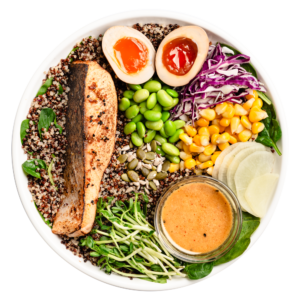Epigenetics is a groundbreaking field that uncovers how environmental factors can influence the activity of our genes without altering the DNA sequence itself. Think of it as the bridge between nature and nurture, revealing how lifestyle choices, including diet, can turn genes on or off, thereby affecting health outcomes. This science demonstrates that we are not merely at the mercy of our genetic makeup; instead, we can actively shape our health by influencing how our genes are expressed. As highlighted in the study The Impact of Nutrition and Environmental Epigenetics on Human Health and Disease, dietary choices can significantly affect gene expression through mechanisms such as DNA methylation and histone modification. This underscores the power of nutrition to alter epigenetic patterns, thereby reducing the risk of chronic diseases and promoting overall health.
One of the most compelling areas of epigenetics is the role of nutrition. What we eat doesn’t just fuel our bodies—it communicates with our DNA, triggering chemical changes that regulate gene activity. These changes can have profound effects on our risk of developing chronic diseases, our mental and physical health, and even our longevity. Foods rich in specific nutrients and bioactive compounds can promote beneficial epigenetic modifications, while diets high in processed or unhealthy foods may contribute to harmful changes.
By understanding the connection between diet and epigenetics, we can harness the power of food to optimize gene expression, paving the way for improved health and disease prevention. Let’s dive deeper into how dietary choices can shape our epigenetic landscape.
How Diet Influences Epigenetics
Diet has a direct impact on the chemical processes that regulate gene expression, such as DNA methylation and histone modification. These processes control whether a gene is active or silent. Below, we explore how specific dietary components influence epigenetic mechanisms and their effects on health.
1. Fruits and Vegetables: Epigenetic Powerhouses
Fruits and vegetables are loaded with polyphenols, vitamins, and antioxidants that can positively influence gene expression.
- Polyphenols: Found in foods like berries, spinach, and broccoli, these compounds can reduce inflammation by modulating genes linked to chronic diseases such as cancer and heart disease.
- Antioxidants: Vitamins C and E protect against oxidative stress, which can lead to harmful epigenetic changes over time.
Example: Regular consumption of polyphenol-rich vegetables, such as cruciferous vegetables, has been shown to regulate genes that suppress tumor formation.
2. Healthy Fats: Nourishing Your Genes
Omega-3 fatty acids, found in foods like salmon, walnuts, and flaxseeds, play a crucial role in promoting beneficial epigenetic changes.
- Anti-inflammatory Effects: These fats reduce inflammation by modulating genes involved in immune responses.
- Brain Health: Omega-3s influence genes that support cognitive function and mental health.
Example: Studies suggest that omega-3 fatty acids can enhance gene expression related to neuroplasticity, improving memory and learning.
3. Whole Grains: Supporting Metabolic Health
Whole grains like quinoa, oats, and brown rice deliver fiber and micronutrients that actively enhance healthy gene expression.
- Metabolism: Compounds in whole grains influence genes related to insulin sensitivity and weight management.
- Chronic Disease Prevention: Their epigenetic effects may lower the risk of diabetes and cardiovascular disease.
Example: Regular consumption of whole grains has been linked to favorable changes in genes that regulate blood sugar levels, supporting long-term metabolic health.
4. Fermented Foods: Gut Health and Gene Expression
Fermented foods like yogurt, kimchi, and sauerkraut contain probiotics that positively impact the gut microbiome, which in turn influences epigenetics.
- Microbiome and Genes: A healthy gut microbiome can regulate genes involved in inflammation, immunity, and metabolism.
- Disease Prevention: Probiotic-rich diets are associated with reduced risks of autoimmune diseases and obesity.
Example: A diet rich in fermented foods may enhance gene expression related to anti-inflammatory pathways, promoting overall health.
5. Processed Foods: The Epigenetic Downside
Diets high in processed foods, refined sugars, and unhealthy fats are linked to negative epigenetic changes.
- Increased Disease Risk: These foods may activate genes associated with inflammation, insulin resistance, and cancer.
- Long-Term Effects: Over time, these harmful epigenetic changes can become “locked in,” increasing the risk of chronic conditions.
Example: A high-sugar diet can lead to epigenetic modifications that impair insulin signaling, raising the risk of type 2 diabetes.
Nutrients That Drive Epigenetic Changes
Certain nutrients are particularly influential in epigenetic modifications:
- Folate: Essential for DNA methylation, folate-rich foods like leafy greens and legumes support healthy gene expression and reduce the risk of birth defects.
- Vitamin D: Found in fatty fish and fortified foods, vitamin D regulates genes involved in immunity and inflammation, promoting overall health.
- Antioxidants: Foods like nuts, dark chocolate, and berries combat oxidative stress, maintaining healthy epigenetic patterns.
Practical Tips for an Epigenetically Healthy Diet
Understanding the connection between diet and epigenetics empowers individuals to make better dietary choices. Here’s how to support positive gene expression:
- Prioritize Whole Foods: Focus on fruits, vegetables, whole grains, and healthy fats to maximize the intake of beneficial compounds.
- Minimize Processed Foods: Reduce consumption of sugary, fried, and ultra-processed foods to avoid harmful epigenetic changes.
- Include Fermented Foods: Add yogurt, kefir, or kimchi to your diet to support a healthy microbiome and favorable gene expression.
- Stay Consistent: Make gradual but lasting dietary changes to reap long-term health benefits.
The science of epigenetics offers a powerful perspective on how lifestyle choices, especially diet, can influence our genetic destiny. By embracing nutrient-dense, whole foods and minimizing processed options, we can support beneficial gene expression and reduce the risk of chronic diseases.
As research in this field continues to evolve, it reinforces the idea that food is not just sustenance—it’s a tool to optimize health at the molecular level. Start making intentional dietary choices today, and unlock the potential for a healthier tomorrow.




